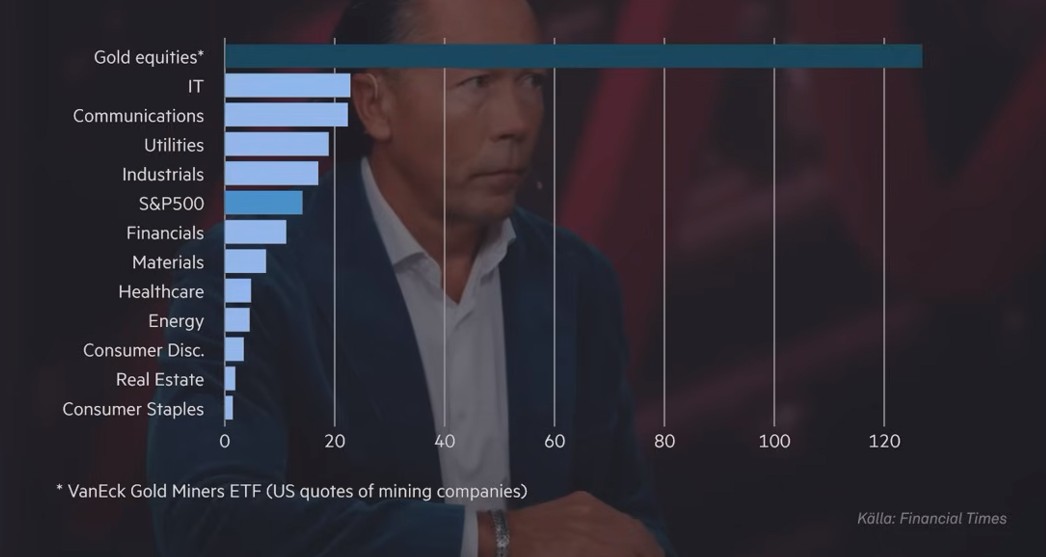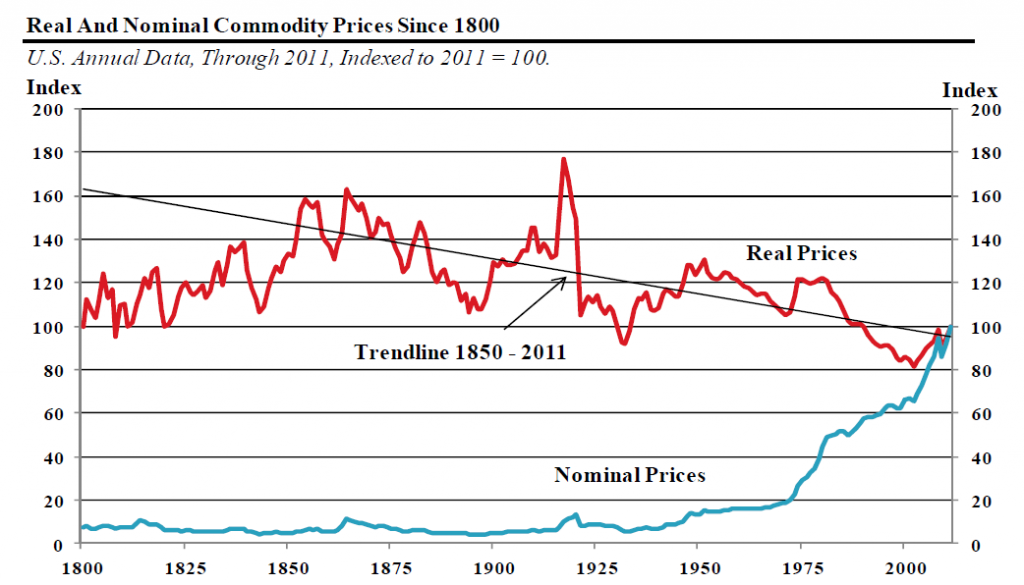Nyheter
A simple route to ruin
Caveat Emptor
 At commodities investment and mining conferences, in bank and broker reports, in coffee shops and airports, people repeat the same bromide: Ever increasing populations and rising global incomes and wealth inexorably means that in the long run commodities prices must rise.
At commodities investment and mining conferences, in bank and broker reports, in coffee shops and airports, people repeat the same bromide: Ever increasing populations and rising global incomes and wealth inexorably means that in the long run commodities prices must rise.
Unfortunately for investors seeking simple routes to riches, this pater noster falls readily in the face of both historical, empirical evidence and economic theory. Real, inflation-adjusted commodity prices have been cut in half since around 1850, even as populations rose seven-fold, global GDP expanded 85 times, and consumption of most commodities increased exponentially.
The world’s population rose seven-fold, from around one billion in 1850 to seven billion today. The population is projected to continue rising, but the growth rate in the world’s population has been and is continuing to slow dramatically, putting less pressure on demand in the future than has been seen over the past 160 years.
World total wealth meanwhile has risen even more dramatically. Global real gross domestic product was around $694 billion in 1820 and $1 trillion in 1870 (in 1990 dollar terms). It is around $72 trillion in 2012.
So, the world’s population has risen sevenfold since 1850 while the global economy today is 85 times larger than it was then, and commodities prices are half of what they used to be, adjusted for inflation. The empirical evidence suggests that just because the world’s population and wealth appear likely to expand in the future, it does not mean at all that commodities prices must rise as well.
Economic theory backs the historical record. Theoretically industrialization should lead to even greater increases in the output of most commodities, at lower prices, with increased discovery and recovery rates, and lower discovery and development costs, for metals and energy resources due to technological advances. This is exactly what has happened. The world’s population has exploded and overall wealth has risen sharply. These increases have led to increased total demand for commodities. Even so, prices have fallen in the long run. Markets do not always respond to the most simple analyses, a point producers, investors, and others should heed.
[box]Denna analys är producerad av CPM Group och publiceras med tillstånd på Råvarumarknaden.se.[/box]
Disclaimer
Copyright CPM Group 2012. Not for reproduction or retransmission without written consent of CPM Group. Market Commentary is published by CPM Group and is distributed via e-mail. The views expressed within are solely those of CPM Group. Such information has not been verified, nor does CPM make any representation as to its accuracy or completeness.
Any statements non-factual in nature constitute only current opinions, which are subject to change. While every effort has been made to ensure that the accuracy of the material contained in the reports is correct, CPM Group cannot be held liable for errors or omissions. CPM Group is not soliciting any action based on it. Visit www.cpmgroup.com for more information.
Nyheter
Vad guldets uppgång egentligen betyder för världen

Guldpriset har nyligen nått rekordnivåer, över 4 000 dollar per uns. Denna uppgång är inte bara ett resultat av spekulation, utan speglar djupare förändringar i den globala ekonomin. Bloomberg analyserar hur detta hänger samman med minskad tillit till dollarn, geopolitisk oro och förändrade investeringsmönster.
Guldets roll som säker tillgång har stärkts i takt med att förtroendet för den amerikanska centralbanken minskat. Osäkerhet kring Federal Reserves oberoende, inflationens utveckling och USA:s ekonomiska stabilitet har fått investerare att söka alternativ till fiatvalutor. Donald Trumps handelskrig har också bidragit till att underminera dollarns status som global reservvaluta.
Samtidigt ökar den geopolitiska spänningen, särskilt mellan USA och Kina. Kapitalflykt från Kina, driven av oro för övertryckta valutor och instabilitet i det finansiella systemet, har lett till ökad efterfrågan på guld. Även kryptovalutor som bitcoin stiger i värde, vilket tyder på ett bredare skifte mot hårda tillgångar.
Bloomberg lyfter fram att derivatmarknaden för guld visar tecken på spekulativ överhettning. Positioneringsdata och avvikelser i terminskurvor tyder på att investerare roterar bort från aktier och obligationer till guld. ETF-flöden och CFTC-statistik bekräftar denna trend.
En annan aspekt är att de superrika nu köper upp alla tillgångsslag – aktier, fastigheter, statsobligationer och guld – vilket bryter mot traditionella investeringslogiker där vissa tillgångar fungerar som motvikt till andra. Detta tyder på att marknaden är ur balans och att kapitalfördelningen är skev.
Sammanfattningsvis är guldets prisrally ett tecken på en värld i ekonomisk omkalibrering. Det signalerar misstro mot fiatvalutor, oro för geopolitisk instabilitet och ett skifte i hur investerare ser på risk och trygghet.
Nyheter
Spotpriset på guld över 4300 USD och silver över 54 USD

Guldpriset stiger i ett spektakulärt tempo, nya rekord sätts nu på löpande band. Terminspriset ligger oftast före i utvecklingen, men ikväll passerade även spotpriset på guld 4300 USD per uns. Guldet är just nu som ett ångande tåg som det hela tiden skyfflas in mer kol i. En praktisk fördel med ett högre pris är att det totala värdet på guld även blir högre, vilket gör att centralbanker och privatpersoner kan placera mer pengar i guld.
Även spotpriset på silver har nu passerat 54 USD vilket innebär att alla pristoppar från Hunt-brödernas klassiska squeeze på silver har passerats med marginal. Ett högt pris på guld påverkar främst köpare av smycken, men konsekvensen av ett högt pris på silver är betydligt mer kännbar. Silver är en metall som används inom många olika industrier, i allt från solceller till medicinsk utrustning.
Nyheter
Guld och silver stiger hela tiden mot nya höjder

Priserna på guld och silver stiger hela tiden mot nya höjder. Eric Strand går här igenom vilka faktorerna som ligger bakom uppgångarna och vad som kan hända framöver. Han får även kommentera aktier inom guldgruvbolag som har haft en bättre utveckling än nästan allt annat. Han säger bland annat att uppgången kommer från låga nivåer och att det i genomsnitt är en mycket högre kvalitet på ledningarna för bolagen idag.
-

 Nyheter3 veckor sedan
Nyheter3 veckor sedanOPEC+ missar produktionsmål, stöder oljepriserna
-

 Nyheter4 veckor sedan
Nyheter4 veckor sedanEtt samtal om guld, olja, fjärrvärme och förnybar energi
-

 Nyheter2 veckor sedan
Nyheter2 veckor sedanGoldman Sachs höjer prognosen för guld, tror priset når 4900 USD
-

 Nyheter2 veckor sedan
Nyheter2 veckor sedanGuld nära 4000 USD och silver 50 USD, därför kan de fortsätta stiga
-

 Analys4 veckor sedan
Analys4 veckor sedanAre Ukraine’s attacks on Russian energy infrastructure working?
-

 Nyheter3 veckor sedan
Nyheter3 veckor sedanBlykalla och amerikanska Oklo inleder ett samarbete
-

 Nyheter4 veckor sedan
Nyheter4 veckor sedanGuldpriset uppe på nya höjder, nu 3750 USD
-

 Nyheter3 veckor sedan
Nyheter3 veckor sedanEtt samtal om guld, olja, koppar och stål














